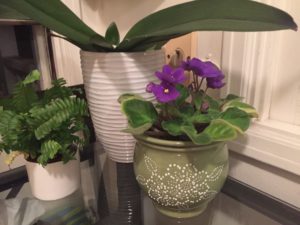 I’m watching the pumpkin fatten in the neighbor’s garden across the alley, I’m watching the spider’s web expand in the corner of my kitchen window, I’m watching as the tiny buds on the African violet on my writing table swell, then open, then shout “I’m here,” to the morning sun.
I’m watching the pumpkin fatten in the neighbor’s garden across the alley, I’m watching the spider’s web expand in the corner of my kitchen window, I’m watching as the tiny buds on the African violet on my writing table swell, then open, then shout “I’m here,” to the morning sun.
Day-by-day, at my kitchen table in the square between two windows, I open my notebook and write. I’m halfway through notebook #8 now in the notebook draft of my memoir, which I started on June 16, 2016. I have the ending, but I don’t have the beginning yet. I have over 125,000 words, far too many for any kind of finished manuscript.

But I’m only on the notebook draft. After this, I’ll do my first edit as I work from the handwritten notebooks, transferring some, but not all, of the scribbled pages into Scrivener and I’ll write new ones, too. This will become my first manuscript draft and then, day-by-day, draft #1, #2, #7, ad infinitum. Who knows how long until I can say “The End.”
All I know if this: the pumpkin will fatten and fatten until it is ready to be someone’s jack-o-lantern, the spider web may trap a creature or two before Carolina uses her cleaning brush to knock it off the screen, the African violet on my writing table will lose its blooms, and pause and wait, and then create new ones.
Day-by-day, the pumpkin, the spider, the violet, and I will do what we do every morning. Day-by-day is what matters.

Yes, day by day. Thanks for a reminder to slow down and go deep!
Thanks for commenting here, Jill. I know that slowing down allows me to really be present in my work and in my life. I need to be reminded all the time! You help me with that. Thank you.
Judy,
The process of doing what is meaningful to us will keep us in harmony
with nature day by day and help us see that we are part of the universal “oneness” of everything. We each have a purpose, like everything in nature, and the important thing is that we participate in the process of that purpose. The end result may be beautiful, ending in death eventually, like everything else. But while we are alive, the challenge is to recognize our purpose.
Thanks Judy…..I can visulize you sitting at your kitchen table writing.
Arlene Kosakoff
Thank you so much for your note, Arlene. I’m so pleased you came to my kitchen table with me, to watch, to notice, to acknowledge and then, to write. I am so grateful for these gifts.
I read this last posting last night, before going to sleep. The beauty of “The Everyday Practices” really sparkled in this piece. The gentle rhythms of nature, beating through your awareness, like a compassionate heartbeat. Your writer’s attention/observation, appreciating the ordinariness of life that is not small, but actually is Life itself. The quiet association of your own work, life and the larger work of nature and creation as compatriots, journeying on. The essay seemed to be a lovely meditation on Being here, now, and sharing that joy with others along the way. Bravo!
Dear Elizabeth, thank you so much for your beautiful comments regarding my Day-by-Day post. I’m so pleased you enjoyed the piece. These small things, as you say, the ordinariness of them, are what accompany us through our work and our lives. Thank you so much.
Excellent advice. Breaking writing into bite size pieces is sometimes the only way we can reduce an 80,000 or 125,000 page ms into something we can visualize. And the only way most people who start ever actually finish it. I love the way you’ve expressed it in terms of the changes going on around you.
I have been contemplating a memoir for about three years now, with other writing and publication intervening. But it is the memoir that calls to me and I have to do something about it. My problem, as imagine it is for most people, is how to carve out that special part of our life that appeals to a mass audience and creates a connection. With a theme and hopefully a message! Seems like a tall order unless you’ve suffered drug addiction, mental illness or an abusive childhood.
Dear Deborah, thank you so much for commenting on the Day by Day post. Fortunately for me, my memoir has a built-in framework. In 1990-91, I sold everything, bought one of those “around-the-world” airline tickets, packed a single suitcase and set off. But even with that seven-month journey as a natural beginning and end frame, I never expected some of the forward/backward motion that would happen between.
Maybe, rather than considering what might appeal to a “mass audience,” you might consider what story you want to tell. Let’s keep talking about this. It is a quandary for others, as you’ve said.
Thank you so much, Judy. I do have a definite time frame in mind with a pretty intense, built-in story that is actually relevant to controversial issues of today. I like what you said about considering it from the standpoint of the story I want to tell, but also didn’t want to be so caught up in it that it didn’t find an audience at all!
Hi Deborah,
I’m taking an online workshop on Memoir Structure through Hedgebrook. In one of the videos, the instructor told us about an interview she’d done with Cheryl Strayed (Wild et al). She asked Strayed what was the first question she asked writers. Her answer “What is the essential question you are trying to answer for yourself in your writing?” The second question: “What is the essential question yo are trying to answer for the reader?” I really liked the way those two tied together in a way that responds to how the story we want to tell will connect with the readers we want to reach. I did a little writing on this and was surprised, but not really surprised, that the question I am trying to answer (and have been trying for decades, maybe my whole life), is a universal question, which means if I tell my story well, I should be able to reach my audience. I’m going to do more work on this. Will keep you posted.
I didn’t keep track of this for a few days — I am working on my own paternals memoir aka life in my father’s family. It came to me that I have to follow my own intent which I managed to fall away from: to make it an observation of the past, not to relive it. In other words to observe with my adult mind (when did I grow up?) what happened as a kid and what I can explain about that now.
I’m not writing for a large audience but for family members, the elders who will laugh or say, “I never said that” (yes you did), and the cousins who are all at least ten years younger than I. They need to know there was life before them and since I knew our grandparents in ways they cannot then they need the stories. Their parents, my aunts, were new adults when I was a kid (although I am not a day over 40, right) so it will be fun for them to see their development from fresh faced newlings to the parents they know.
Because I make notes in three different notebooks and then have to type them I am having fun fitting those in. I do this every time, back and forth. I wrote a novel like that and swore it won’t happen again. Sigh. However I see that finally, finally, the writing is getting more observational than anecdotal.
Thanks, Linda
I like going from notebooks for the draft and then putting it into the computer, making that my first edit, seeing how those scribbles fit into the picture that is emerging as I type and organize. I’ve still got some notebook scratching to do before I get to the typing part. Glad you’re making discoveries about yourself and those times as you write. This is why we write memoir, I think. To discover what influence who we are now.
A lovely piece Judy
I made a vow, many years ago, to explore my life though writing. And since that day I have kept to it ( almost). Whether it is considered to be ‘good’ or ‘bad,’ publishable or not, is something I do not concern myself about – my only interest is to turn up and do the work. I think of myself not as an ‘artist’ (possibly ‘temperamental,’ idealistic, overly concerned with perfection ) but rather a ‘workman’ laying brick ( word ) by brick ( word ) until something emerges…..
“ If you take on writing as your practice, to recognize that writing is your practice, you need to have the attitude ‘ write or die. ‘ Not because you ‘ should,’ but because if writing is your practice, if you don’t write, you will feel something terribly important is missing from your life – and nothing, including prayer, meditation, exercise, money or love will make up for it.”
Gail Sher
Thank you, Michael. Again you’ve posted something that really touches me. Gail Sher’s book, “Four Continuous Mistakes,” was my morning meditation book for many years, read first, then write. I love the story of her ceiling falling in, and there she was, at her writing table, writing. You are a workman laying brick… maybe you are a “wordman.”
Judy, I love this note. Every morning I, too, sit at my kitchen table by a wide window, notebook and pencil in hand, and watch the changes in my hackberry tree with its feathered and furry inhabitants. You have written Day-By-Day right to my heart. Thank you so much for this beautiful beginning of my writer’s group Friday.
Oh Bonnie, I love the idea of you and I at our kitchen tables with our notebooks and views out the window. Thank you for your note. Lovely!
Ah bliss, Judy. Bliss.
What we do, day at a time. Thanks, Linda.
Beautiful
Thanks, Barb. You didn’t even mention my “ings” in the first graph. I wanted to imply that my “watching,” etc. was ongoing.